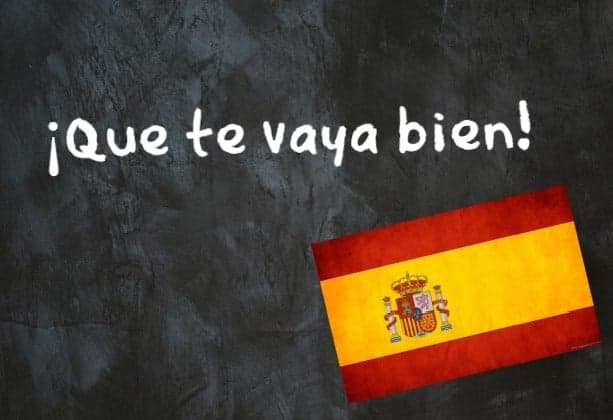Spanish Expression of the Day: ¡Que te vaya bien!

If you live in Spain, you’ve probably heard this all the time when saying good bye to people. But what does it actually mean?
Why do I need to know this expression?
Because it’s one of those expressions that’s used all the time in daily conversation in Spain.
You say “que te vaya bien” when ending off a conversation with someone and wishing them well.
It’s similar to “cuídate” although that’s more specifically like ‘take care’ in English.
“Que te vaya bien” can be used to wish someone good luck or to generally wish them well in life.
Almost like an afterthought which doesn’t necessarily refer to an event that you want them to have good fortune for, just general well wishes when ending a chat.
What do all the words mean?
The closest translation is “I hope it goes well”.
The “que” at the start is a common feature of spoken Spanish when wishing something to someone or giving them an order, such as “¡Que te calles! (shut up) or “¡Qué tengas un buen día!” (Have a good day!).
Then comes the “te” for reflexive verbs. And yes, the verb that follows is in the subjunctive (We can hear the collective groans from here).
When can I use it?
It’s generally considered an informal expression which is used more commonly in conversation.
You wouldn’t generally sign off an email to your Spanish boss with it, unless you wanted to wish them good luck with something specific. So it’s not quite the same as writing “all the best” to sign off.
A good reply to "que te vaya bien" in conversation can be "y a ti también", to wish them all the best as well.
After saying or writing “que te vaya bien”, you can name the thing you’re well-wishing for, such as “que te vaya bien el examen” (I hope the exam goes well) or “que te vaya bien la cita con el medico” (I hope your appointment with the doctor goes well).
How about some examples?
“¡Venga!¡Que te vaya bien! ¡Nos vemos!”
Okay, take care! See you soon!
“Que te vaya bien con tu hermana”
I hope it goes well with your sister
If you're having doubts about how to pronounce the words, this song by Spanish pop singer Manuel Navarro should help.
READ MORE:
Comments
See Also
Why do I need to know this expression?
Because it’s one of those expressions that’s used all the time in daily conversation in Spain.
You say “que te vaya bien” when ending off a conversation with someone and wishing them well.
It’s similar to “cuídate” although that’s more specifically like ‘take care’ in English.
“Que te vaya bien” can be used to wish someone good luck or to generally wish them well in life.
Almost like an afterthought which doesn’t necessarily refer to an event that you want them to have good fortune for, just general well wishes when ending a chat.
What do all the words mean?
The closest translation is “I hope it goes well”.
The “que” at the start is a common feature of spoken Spanish when wishing something to someone or giving them an order, such as “¡Que te calles! (shut up) or “¡Qué tengas un buen día!” (Have a good day!).
Then comes the “te” for reflexive verbs. And yes, the verb that follows is in the subjunctive (We can hear the collective groans from here).
When can I use it?
It’s generally considered an informal expression which is used more commonly in conversation.
You wouldn’t generally sign off an email to your Spanish boss with it, unless you wanted to wish them good luck with something specific. So it’s not quite the same as writing “all the best” to sign off.
A good reply to "que te vaya bien" in conversation can be "y a ti también", to wish them all the best as well.
After saying or writing “que te vaya bien”, you can name the thing you’re well-wishing for, such as “que te vaya bien el examen” (I hope the exam goes well) or “que te vaya bien la cita con el medico” (I hope your appointment with the doctor goes well).
How about some examples?
“¡Venga!¡Que te vaya bien! ¡Nos vemos!”
Okay, take care! See you soon!
“Que te vaya bien con tu hermana”
I hope it goes well with your sister
If you're having doubts about how to pronounce the words, this song by Spanish pop singer Manuel Navarro should help.
Join the conversation in our comments section below. Share your own views and experience and if you have a question or suggestion for our journalists then email us at [email protected].
Please keep comments civil, constructive and on topic – and make sure to read our terms of use before getting involved.
Please log in here to leave a comment.